 Petzlover
Petzlover Galgo Espanol is originated from Spain but Himalayan Sheepdog is originated from India. Both Galgo Espanol and Himalayan Sheepdog are having almost same height. Galgo Espanol may weigh 16 kg / 35 pounds lesser than Himalayan Sheepdog. Both Galgo Espanol and Himalayan Sheepdog has almost same life span. Both Galgo Espanol and Himalayan Sheepdog has almost same litter size. Galgo Espanol requires Low Maintenance. But Himalayan Sheepdog requires High Maintenance
Galgo Espanol is originated from Spain but Himalayan Sheepdog is originated from India. Both Galgo Espanol and Himalayan Sheepdog are having almost same height. Galgo Espanol may weigh 16 kg / 35 pounds lesser than Himalayan Sheepdog. Both Galgo Espanol and Himalayan Sheepdog has almost same life span. Both Galgo Espanol and Himalayan Sheepdog has almost same litter size. Galgo Espanol requires Low Maintenance. But Himalayan Sheepdog requires High Maintenance
 Galgo Espanol means Spanish with galgo meaning greyhound, thus a Spanish Greyhound. This breed is ancient with their roots in perhaps the English greyhound and others in the sighthound family. They are much like the greyhound in that they are laid back, calm, gentle and quiet, unless they are competing on the local track. Like the greyhound they are shy and reserved; great with kids and other pets. And of course, they love cats.
Galgo Espanol means Spanish with galgo meaning greyhound, thus a Spanish Greyhound. This breed is ancient with their roots in perhaps the English greyhound and others in the sighthound family. They are much like the greyhound in that they are laid back, calm, gentle and quiet, unless they are competing on the local track. Like the greyhound they are shy and reserved; great with kids and other pets. And of course, they love cats.
There are dogs like the Galgo referred to in writing by the ancient Celts and Romans. One author, Arrian, had his own Galgos and used them when hunting. The breed flourished in the second half of the Middle Ages in Spain and well into the 8th century. When the Christians regained control of the Iberian Peninsula, they did away with the hunter old forms of hunting and introduced a new form with hounds that made the Galgo the pride of the aristocracy and not in the homes of the ordinary people. Arrian claim to two types of dogs, the smooth and rough coated.
Muslim and Chrisitan Kings kept Galgo Espanols. In all probability the Saluke and Galgo were crossbred at this time. It was illegal to kill a Galgo and in 1081, the Mayor of Cartuario of Slonza left his Galgo in his will to Diego Citid. Dogs seen in painting from the 12th century look just like dogs of this breed who can be seen today.
It is believed that when the Galgo was developed, it was in the midsection of Spain or the Castillian plains. They ruled the interior of the country while the bloodhound ruled the exterior. The 18th and 19th centuries saw very little change in the breed. However, in the 20th century, there was cross breeding with the English greyhound that produced a leaner, faster and powerful track racing dog. The results was a faster dog without the long distance stamina of the pure Galgo. For this reason, the breeders returned to breeding the pure professional racing dog.
The sport of racing the Galgo earns Spain around sixty million dollars per year. They train anywhere from three to four thousand of the Galgos every year for Open Field Coursing Championships. Still, there no longer is any cross breeding between the Greyhound and the Galgo. The current coursing programs feature a hare that is much hardier and difficult to pursue so the stamina of the old Galgo Espanol is desired. In Castile, where these games are played, the landscape is open with large fields that requires that the hare travels far greater distances. This means that the stamina of the original Galgo Espanol is needed.
When not racing the Galgos have become great house pets. They have a reputation as gentle dogs that are docile and quiet, with good health. This reputation is well earned. They are also successful show dogs in Europe much more than the states. This is perhaps because they are really rare outside of Spain. They are not recognized by the United Kennel Club nor the American Kennel Club.
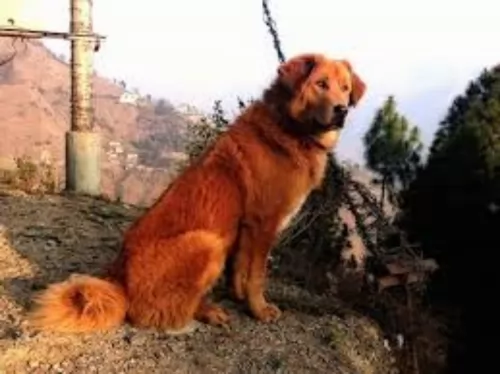 The Himalayan Sheepdog comes from Nepal originally and was bred as a guardian for livestock. The exact location where the breed comes from is not documented well but it is thought that they come from North India and Nepal and they are rare outside of that area. They are a mountain dog – close in ancestry to the Himalayan Mastiff, and the Kinnaur Sheepdog of Tibet (Himalaya). All these Himalayan mountain dogs were all called “Gaddi dogs”. The term was used for all the large dogs no matter what their breeds actually were.
The Himalayan Sheepdog comes from Nepal originally and was bred as a guardian for livestock. The exact location where the breed comes from is not documented well but it is thought that they come from North India and Nepal and they are rare outside of that area. They are a mountain dog – close in ancestry to the Himalayan Mastiff, and the Kinnaur Sheepdog of Tibet (Himalaya). All these Himalayan mountain dogs were all called “Gaddi dogs”. The term was used for all the large dogs no matter what their breeds actually were.
The Himalayan Sheepdog is called by various names depending on where they were from. They are called Gaddi Leopardhund in Himachai Pradesh, In Nepal they are known as Bhote Kukkur or Bhotiya. Then there are Chamba Gaddi dogs. They are an ancient breed that existed before documentation on breeds was kept.
They acted as both guardians and herders. They guarded the mountain men’s encampments as well as the livestock. They were also used at times to hunt large animals. Today they are found only within Nepal and India. These Himalayan Sheepdogs are on the verge of extinction in India. There are no breeding programs and their isolation has caused the dilution of the gene pool. It is not recognized by any clubs including the UKC and the AKC.
 Obviously the Galgos looks a lot like the Greyhound, but in some very important ways they are very different. The rear of the Galgos is higher than the front and their muscle are flatter. They are built for endurance while the Greyhound is built for speed. The Galgos is a lighter, smaller dog with larger ear on a long head. They have long tails and their chests are not deep like the Greyhounds.
Obviously the Galgos looks a lot like the Greyhound, but in some very important ways they are very different. The rear of the Galgos is higher than the front and their muscle are flatter. They are built for endurance while the Greyhound is built for speed. The Galgos is a lighter, smaller dog with larger ear on a long head. They have long tails and their chests are not deep like the Greyhounds.
The Galgo comes in smooth and rough coats and a variety of colors. The rough coat protects dogs that are in climates colder than the ones in Spain and also keeps them from injuring their skin while running. The colors include brindle, black, golden, toasted, cinnamon, yellow, red, white, white with patches, or any color as long as they have a white forehead and muzzle.
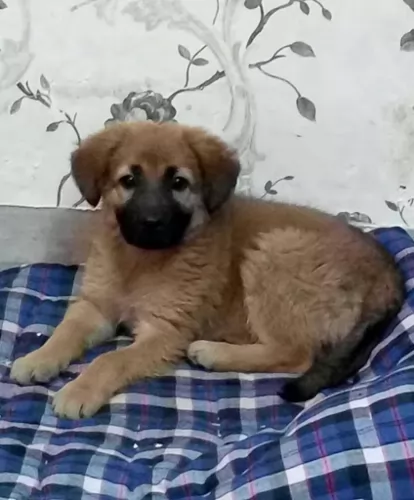 The breed is a large dog, very athletic and strong. The Himalayan Sheepdog is muscular with a deep chest, strong neck and strong shoulders. It has a medium tail that is thick and busy, curled high over its back. It is a daunting dog that can be very intimidating. They have well padded and large paws. With a broad head and wide forehead, they have a strong, wide muzzle. Their ears are high on the head and hang from the sides. They have almond shaped medium eyes that are deep set with a black nose.
The breed is a large dog, very athletic and strong. The Himalayan Sheepdog is muscular with a deep chest, strong neck and strong shoulders. It has a medium tail that is thick and busy, curled high over its back. It is a daunting dog that can be very intimidating. They have well padded and large paws. With a broad head and wide forehead, they have a strong, wide muzzle. Their ears are high on the head and hang from the sides. They have almond shaped medium eyes that are deep set with a black nose.
They are a very active and swift dogs. By their nature they are constantly in motion, patrolling their territory and guarding their flock and people. Their devotion to their people and their courage is the stuff of legends. Their coat is double with a large ruff around their necks that resembles a mane. The inner coat is dense and short while the outer coat is longer but dense as well.
 They are good with children, but you need to be careful no one gets knocked down or hurt.
They are good with children, but you need to be careful no one gets knocked down or hurt.
Stamina for running and a good record in lure coursing.
Though they can be couch potatoes like greyhounds they are better off with a fenced yard and not an apartment.
They are smart and can learn anything you want to teach them if you can keep their attention.
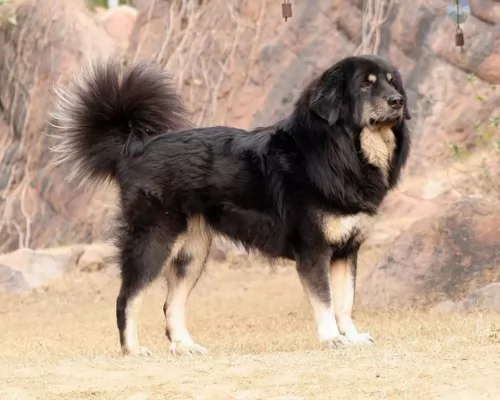 Yes with enough proper socialization
Yes with enough proper socialization
Protection and loyalty
They are not especially adaptable and need a large yard. They are not good in an apartment.
Intelligent but stubborn and independent making them able to learn if they want to.
 Being a large dog, the Galgo Espanol would normally face a high probability of hip dysplasia. Fortunately for the breed this is not true. In this respect their lightness of weight, their history as a working dog and their anatomy have protected them from it. They are however susceptible to other issues.
Being a large dog, the Galgo Espanol would normally face a high probability of hip dysplasia. Fortunately for the breed this is not true. In this respect their lightness of weight, their history as a working dog and their anatomy have protected them from it. They are however susceptible to other issues.
Malignant tumors that quickly spread throughout the body. Life threatening.
As a sighthound, the Galgo Espanol is prone to have issues anytime with anesthetics. They don’t metabolize the anesthetics like other dogs do. They will take longer to revive, and they are susceptible to hypothermia while under an aesthetic.
While running, they are prone to injuries
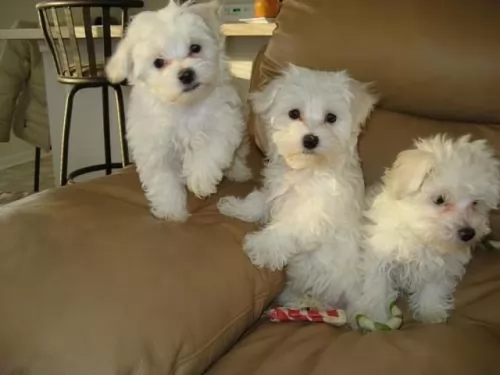 This is a pretty healthy breed with very few health issues. They have the usual large dog issues.
This is a pretty healthy breed with very few health issues. They have the usual large dog issues.
 Feed your puppy a high quality dry food made for large breed dogs. Feed 3 meals a day 2.5 to 3 cups total for the day.
Feed your puppy a high quality dry food made for large breed dogs. Feed 3 meals a day 2.5 to 3 cups total for the day.
Feed your adult Galgo a high quality dry food made for large breed dogs. Feed 2 meals a day but don’t overfeed Give 4-5 cups total for the day.
They have amazing stamina and good speed. Generally good health as a breed.
He can be a couch potato indoors and runs forever outdoors. He does need daily exercise and bedrest both. The best would be if you could sprint him every day or have a small yard he can play in. They excel of course at agility and lure coursing. Keep them on a leash because if they run you will never catch them. The American Sighthound Field Association presents lure coursing events that they are eligible for. They have exceled at show competition in Europe but are not well known in the U.S.
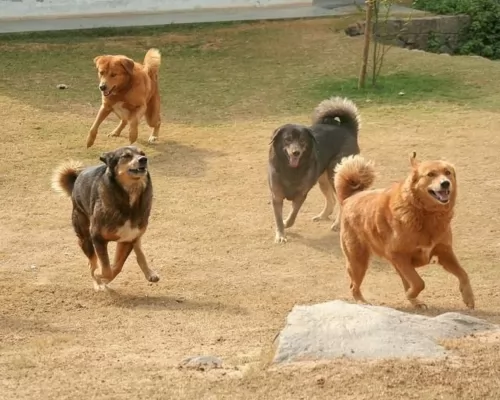 Feed the puppy 2-3 times a day with a total of two cups of a quality dog food for large breed dogs.
Feed the puppy 2-3 times a day with a total of two cups of a quality dog food for large breed dogs.
Feed the adult dog twice a day with 3 to 4 cups of a high quality dry dog food for large breed dogs.
They are very strong and athletic.
The Himalayan Sheepdog needs exercise but not to be overworked. They should be taken on long walks at least once a day. They might play fetch or run in a yard, but they don’t like too much exercise.